Can Cats Eat Potato Chips? Understanding the Risks of Sharing Chips with Your Cat
- 10 Mar 2025 11:07
We all know how tempting it is to share our snacks with our furry friends, but when it comes to potato chips, it’s important to pause and think about whether it’s safe for your cat. While cats may find the salty, crunchy texture appealing, potato chips are not a good treat for them. In fact, feeding your cat potato chips could pose several health risks.
In this article, we’ll explain why cats shouldn’t eat potato chips, the potential dangers, and some healthier alternatives to keep your feline friend happy.
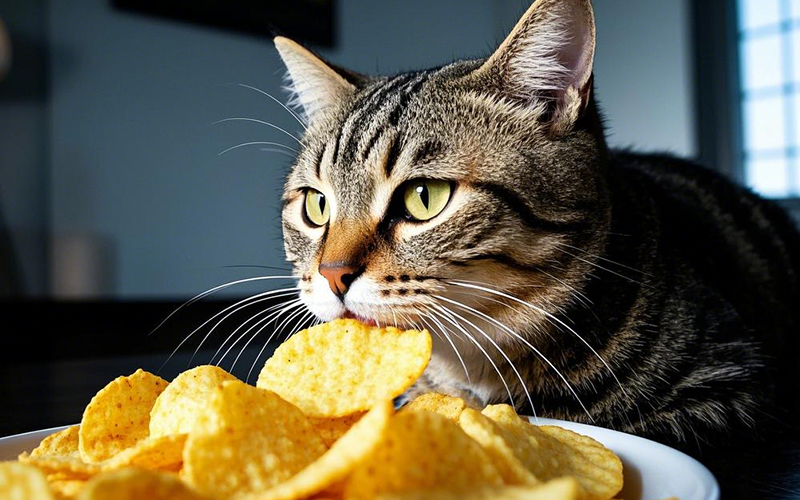
Why Potato Chips Are Not Safe for Cats 🍟❌
While potato chips are a popular human snack, they are not suitable for cats due to several reasons:
1. High Salt Content 🧂
One of the biggest concerns with potato chips is their high salt content. Cats, like most pets, have much lower tolerances for salt than humans. Eating salty foods can lead to salt poisoning in cats, which can cause symptoms like excessive thirst, urination, vomiting, and even more serious health issues, such as kidney damage or high blood pressure if consumed in large quantities.
Salt poisoning is dangerous, and cats are particularly vulnerable to it, so it’s best to avoid giving them salty snacks like potato chips.
2. High in Fat 🍔
Potato chips are also high in fat, which is not ideal for cats. While cats do need some fat in their diet for energy and to support healthy skin and coat, too much fat can lead to obesity, digestive problems, and even pancreatitis, an inflammation of the pancreas that can be life-threatening.
Since potato chips are often fried in oil, they have a high fat content, and feeding them regularly can contribute to unhealthy weight gain and other health complications.
3. Seasonings and Additives 🌶️
Most commercially produced potato chips are flavored with seasonings such as onion powder, garlic powder, and other additives. These ingredients are toxic to cats. Garlic and onions, even in small amounts, can cause damage to your cat’s red blood cells, leading to anemia. Cats are particularly sensitive to these substances, and even small amounts can have serious health consequences.
4. Not a Natural Part of Their Diet 🍽️
Cats are obligate carnivores, meaning their bodies are designed to thrive on a diet rich in animal proteins and fats. Potato chips are made from potatoes and oil, which are not a natural or necessary part of a cat’s diet. Cats lack the digestive enzymes needed to break down and properly absorb carbohydrates from plant-based foods like potatoes, making chips an unsuitable snack for them.
What Could Happen If Your Cat Eats Potato Chips? 🚨
If your cat happens to eat a small amount of potato chips, they might not experience any immediate issues. However, consuming them regularly or in large quantities can lead to several potential health problems, including:
Salt poisoning: Symptoms include increased thirst, vomiting, and lethargy. Severe poisoning can lead to kidney damage.
Obesity: Regular consumption of fatty foods like potato chips can contribute to unhealthy weight gain, leading to obesity and its related health issues.
Gastrointestinal problems: High-fat, processed foods can cause stomach upset, including vomiting, diarrhea, and constipation.
Toxicity from seasonings: Garlic, onion, and other seasonings can cause damage to your cat’s red blood cells, leading to anemia and other health problems.
If your cat eats a large amount of potato chips, especially with added seasonings, it’s essential to contact your vet immediately to ensure they don’t experience any harmful effects.
Healthier Alternatives to Potato Chips for Cats 🐾🍴
If you’re looking for a treat to share with your cat, there are many healthier options to consider:
1. Cat-Specific Treats 🍪
There are plenty of commercially available cat treats that are specifically formulated to meet your cat’s nutritional needs. Look for treats made with high-quality protein sources, such as chicken or fish, and without artificial additives or excessive amounts of salt.
2. Cooked Meat 🍗
Cats love meat, and a small amount of cooked chicken, turkey, or fish can be a much safer and more nutritious snack than potato chips. Ensure that the meat is plain and free from any seasoning, oils, or additives, as these can be harmful to your cat.
3. Catnip 🌿
Many cats enjoy catnip, which is a natural herb that can provide entertainment and stimulation. It’s a safe and fun treat for your cat, and it has no harmful side effects. You can sprinkle some dried catnip on their favorite toys or even use it in homemade cat treats.
4. Canned Pumpkin 🎃
Canned pumpkin is a healthy treat for cats in moderation. It’s high in fiber, which can help with digestion, and it’s a safe option for cats that are experiencing mild constipation. Make sure to use plain, unsweetened pumpkin (not pumpkin pie filling, which may contain harmful additives).
5. Small Amounts of Cheese 🧀
Some cats love cheese, and a small amount of cheese can be a good treat. However, be cautious, as some cats are lactose intolerant, and too much cheese can cause gastrointestinal upset. Offer cheese in moderation and observe how your cat reacts.
How to Prevent Your Cat from Eating Potato Chips 🍽️
If you’re worried about your cat sneaking a snack from your chips bag, here are some tips to keep them safe:
Keep Chips Out of Reach: Store potato chips and other human snacks in cabinets or containers that are out of your cat’s reach.
Be Mindful During Snack Time: When eating snacks, avoid feeding your cat from your plate or bowl. Offer them their own treats or food instead.
Offer Safe Alternatives: Keep healthy treats on hand so that when your cat asks for a snack, you have something nutritious to offer.
How PettureX Can Help With Your Cat’s Diet and Health 🐾💡
If you’re ever uncertain about what’s safe for your cat to eat, PettureX can be a valuable resource. PettureX is an AI-powered pet health assistant that provides 24/7 online consultations for all your pet health questions. Whether you’re curious about what snacks are safe or need advice on managing your cat’s diet, PettureX can offer helpful guidance to ensure your cat stays healthy and happy.
Conclusion 🎉
Can cats eat potato chips? While it might be tempting to share your snacks with your feline friend, potato chips are not a suitable or safe treat for cats. The high salt content, fat, and harmful seasonings make them a risky snack that can lead to health problems, such as salt poisoning, digestive issues, or even toxicity from garlic and onions.
Instead of chips, consider offering your cat healthier, more appropriate treats like catnip, cooked meat, or specially formulated cat treats. And if you ever have concerns about your cat’s diet or eating habits, PettureX is always available to help with expert advice and support!
Related
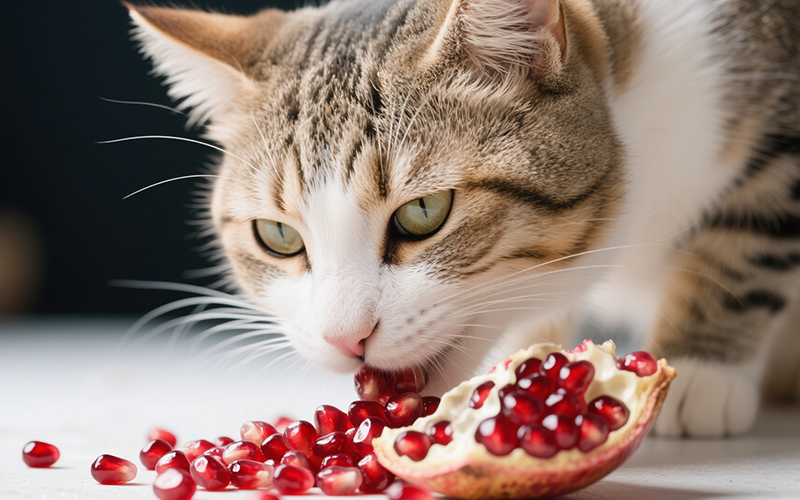
Pomegranate Peril: Can Cats Eat the Seeds Safely? A Vet-Reviewed Guide
- 25 Apr 2025
Prickly Problem: Can Cats Eat Pineapple Leaves Safely? A Vet-Reviewed Risk Analysis
- 25 Apr 2025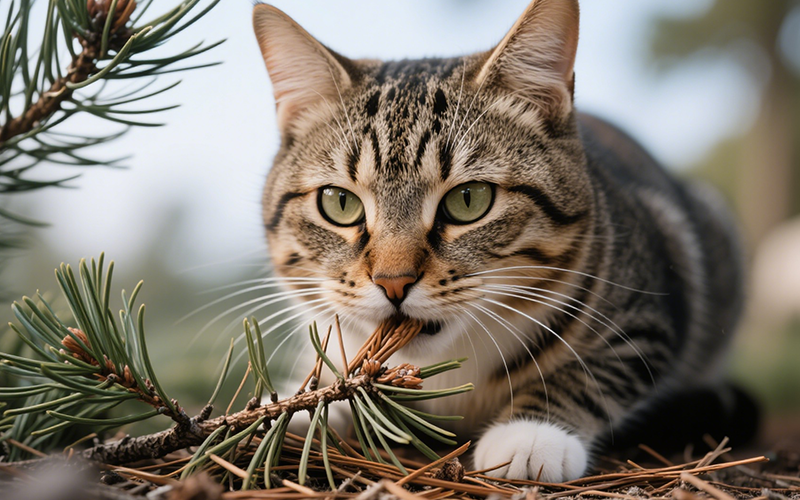
The Prickly Truth: Can Cats Eat Pine Needles Safely? A Guide for Concerned Owners
- 24 Apr 2025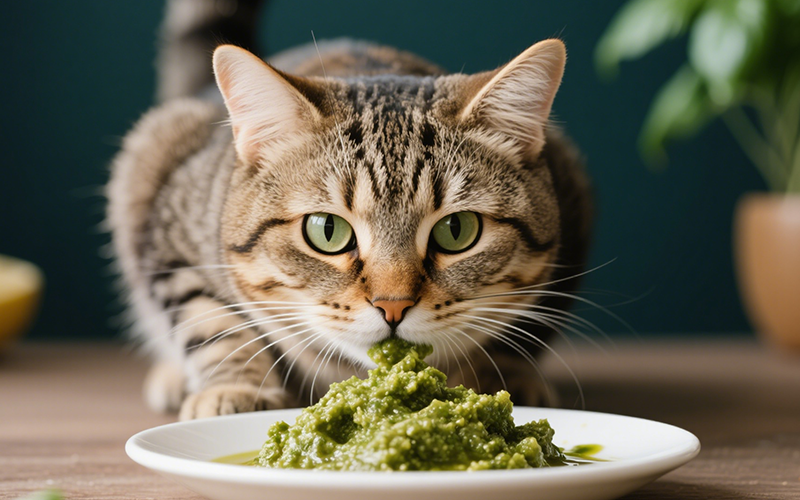
Pesto & Paws: A Dangerous Mix? Can Cats Eat Pesto Safely?
- 24 Apr 2025
Persimmons and Paws: Can Cats Safely Eat This Autumn Fruit? A Vet-Reviewed Guide
- 23 Apr 2025
Nutritional Yeast for Cats: Savory Sprinkle or Health Hazard? A Vet-Reviewed Guide
- 23 Apr 2025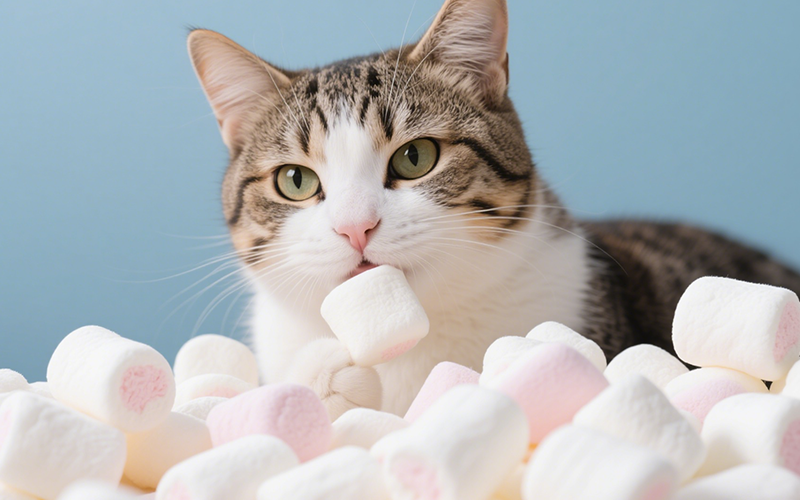
Marshmallows and Cats: A Puffy Problem? Why Vets Say No to This Sugary Snack
- 22 Apr 2025
Kefir for Kitties? A Veterinarian-Reviewed Guide to Safety, Benefits & Risks
- 22 Apr 2025
The Burning Question: Can Cats Eat Jalapenos? A Comprehensive Safety Guide
- 21 Apr 2025
Cool Temptation: Can Cats Eat Ice Cream Safely? The Vet-Backed Truth
- 21 Apr 2025
